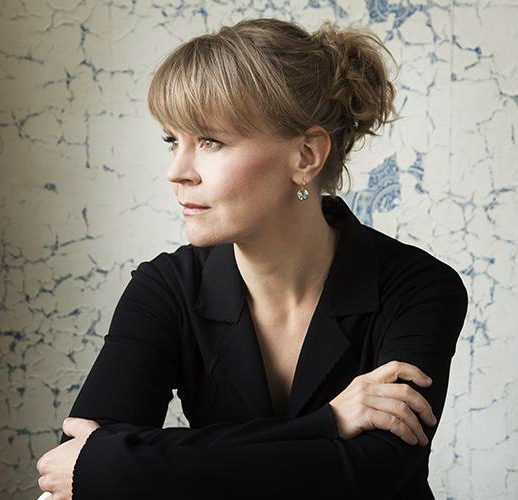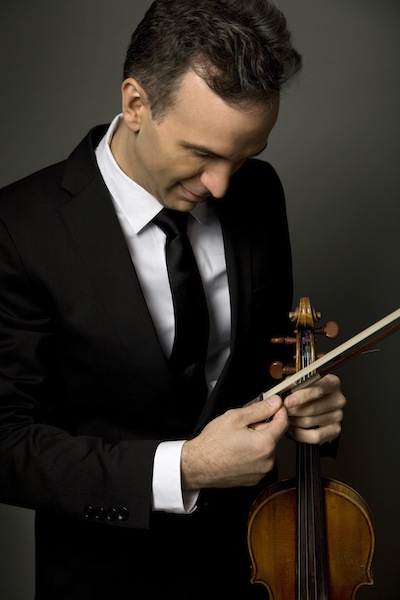Mälkki, CSO shine brightly in “Sheherazade”

It’s fascinating to consider how and why some music falls out of the regular repertory. Roy Harris’s craggy, compact Third Symphony was one of the most performed American works of the 20th century—until a few decades ago when suddenly it wasn’t.
Likewise, Sheherazade was the main work keeping Nikolai Rimsky-Korsakov’s name in program books for most of the last century, though its post-millennial profile is no longer that of a concert hall staple. Overexposure and too many loud, unsubtle performances that treated Sheherazade as a bombastic showpiece seem to have taken their toll.
Thursday night’s Chicago Symphony Orchestra concert led by Susanna Mälkki provided admirable restoration work on Rimsky’s epic symphonic suite with a notably fresh and exhilarating Sheherazade.
The Finnish conductor’s regular appearances with the CSO have been one of the happiest developments of recent seasons. Mälkki, who takes the reins of her nation’s venerable Helsinki Philharmonic Orchestra this fall, is a dynamic podium figure who consistently elicits intelligent and exciting results across a wide range of repertory. (She will be back next season to lead the world premiere of a CSO commission by Melinda Wagner.)
Rather than treating Sheherazade as souped-up cinematic music, Mälkki led a refined, organic performance that took the composer’s markings at face value, directing with clear, sweeping gestures that became increasingly animated as the music speeds up.
Mälkki builds chords from the ground up, as with the full-bodied opening bars with rich basses and low brass. Yet she consistently elicited bracing and transparent textures, and the effect was illuminating in music not known for subtlety or depth, like cleaning the accumulated excess and grime off of a 15th-century wall tapestry. The “Storm at Sea” section went with all due turbulence and the big lyrical climaxes were developed naturally, registering with lean, gleaming resplendence.
Mälkki also correctly views Sheherazade as one of the great concertos for orchestra, giving CSO principals striking freedom in their numerous solo passages. The front desk work was characterful and ravishing across all sections; especially laudable were Stephen Williamson’s febrile clarinet, Robert Chen’s silken, sinuous violin solos as the title tale-weaver, and Keith Buncke’s remarkably nuanced and expressive bassoon.
The final movement’s contrasting sections were especially vivid, well directed and magisterial leading to a hushed, shimmering coda. “Beautiful!” commented one audience member before the enthusiastic and extended applause.
Amazingly, Bartok’s Violin Concerto No. 2 has not been played by the CSO in a decade. There was a nice symmetry to this week’s performances: Pierre Boulez was Mälkki’s mentor and Gil Shaham made an excellent recording of the concerto with Boulez and the CSO in 1998.
The American violinist and Finnish conductor proved close and simpatico partners, with the restless, mobile Shaham often moving next to the podium for key solo passages as if he and Mälkki were performing a kind of vast duo writ large.
Shaham’s pure, highly focused tone consistently underlined the lyrical element, treating the opening pages of the central theme and variations as a hushed reverie. Yet he also put across the bravura sections with bristling intensity, and the chromatic astringency was also manifest in Mälkki’s robust, punchy accompaniment. The contrasting sections of the finale always seem to come around one time too many but Shaham and Mälkki made the strongest case for this music, ratcheting up the tension to a blazing coda.
The evening led off with Debussy’s “Gigues,” the opening section from his tripartite Images, which the CSO gave the U.S. premiere of in 1914.
Mälkki led a performance that adroitly balanced the quirky dance-like vigor and austere unease, with fine contributions from guest flutist Catherine Ransom Karoly, associate principal of the Los Angeles Philharmonic.
The program will be repeated 1:30 p.m. Friday and 8 p.m. Saturday. cso.org; 312-294-3000.
Posted in Performances



